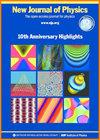公共产品博弈中的高阶互动和零决定策略
IF 2.8
2区 物理与天体物理
Q2 PHYSICS, MULTIDISCIPLINARY
引用次数: 0
摘要
自从普雷斯和戴森巧妙地发现了零判定(ZD)策略以来,人们一直致力于研究ZD策略的演化性能。最近,高阶交互作用对演化博弈的影响引起了广泛的兴趣,而高阶交互作用如何影响 ZD 策略的演化表现却仍是未知数。本文重点研究了迭代公共物品博弈中高阶互动对ZD策略演化的作用,其中基线报酬是描述节点在一阶和二阶互动中互惠程度的关键参数。通过类似自适应的动力学,我们发现每个网络都有一个临界值,超过这个临界值,网络博弈就会收敛到所有节点都获得相同报酬的共识状态。这个临界值受高阶交互作用相对强度的影响很大,呈 U 型趋势。我们进行了数值模拟,以探索网络结构如何影响动态变化。不同规模网络的结果表明,平均度越高的网络越容易趋同于共识状态。对现实世界网络的模拟进一步支持了理论结论。本文章由计算机程序翻译,如有差异,请以英文原文为准。
Higher-order interactions and zero-determinant strategies in the public goods game
Since the ingenious discovery of zero-determinant (ZD) strategies by Press and Dyson, many efforts have been devoted to the evolutionary performance of ZD strategies. Recently, the effects of higher-order interactions on evolutionary games have attracted widespread interests, whereas it remains unknown how higher-order interactions affect the evolutionary performance of ZD strategies. This paper focuses on the role of higher-order interactions on evolutionary ZD strategies in iterated public goods game, where the baseline payoff is a key parameter to describe nodes’ extent of reciprocity in both first-order and second-order interactions. Through the adaptive-like dynamics, we found that there is a critical value of each network, above which the networked game will converge to a consensus state where all the nodes obtain the same payoff. This critical value is significantly affected by the relative strength of higher-order interactions with a U-shaped trend. Numerical simulations are carried out to explore how the network structures affect the dynamics. The results in networks with different sizes indicate that networks with higher average degree are more easily to converge to the consensus state. The simulations on a real-world network further support the theoretical conclusions.
求助全文
通过发布文献求助,成功后即可免费获取论文全文。
去求助
来源期刊

New Journal of Physics
物理-物理:综合
CiteScore
6.20
自引率
3.00%
发文量
504
审稿时长
3.1 months
期刊介绍:
New Journal of Physics publishes across the whole of physics, encompassing pure, applied, theoretical and experimental research, as well as interdisciplinary topics where physics forms the central theme. All content is permanently free to read and the journal is funded by an article publication charge.
 求助内容:
求助内容: 应助结果提醒方式:
应助结果提醒方式:


